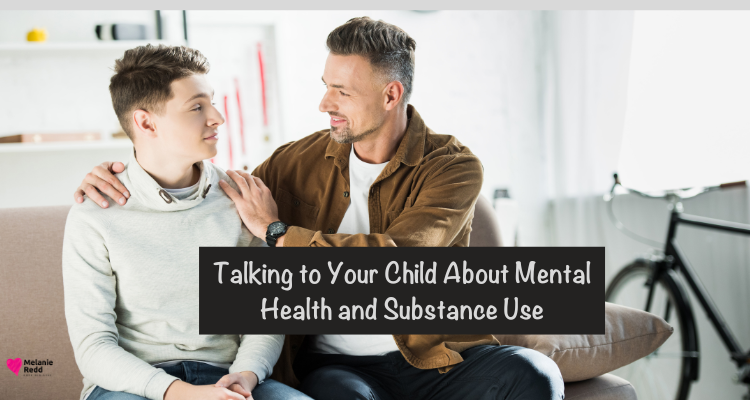Talking to Your Child About Mental Health and Substance Use

Breaking the Stigma: Talking to Your Child About Mental Health and Substance Use
As parents, discussing sensitive topics like mental health and substance use with your child can feel overwhelming. These conversations, however, are essential to breaking the stigma and building a foundation of trust and understanding.
While society has made progress in addressing mental health openly, many families still struggle to broach these topics, leaving children to navigate complex emotions and challenges alone. By fostering an open dialogue, you can empower your child to prioritize their mental well-being and seek help when needed.
Why It’s Important to Talk About Mental Health and Substance Use
Mental health issues and substance use can affect children and teens of all ages, often with lasting consequences if ignored. According to the CDC, an estimated one in five children experience a mental health disorder each year. At the same time, peer pressure and societal stressors contribute to substance use experimentation at earlier ages.
Ignoring these challenges can lead to serious consequences, such as anxiety, depression, academic struggles, or addiction. The sooner parents initiate conversations about mental health and substance use; the better prepared children will be to recognize problems and seek help when needed.
Recognizing the Signs Your Child May Be Struggling
Before starting a conversation, knowing what to look for is essential. Understanding the warning signs of mental health struggles or substance use can help you approach the topic with clarity and empathy.
Mental Health Red Flags
- Persistent sadness or withdrawal from friends and family.
- Changes in eating or sleeping patterns.
- Difficulty concentrating or a sudden drop in academic performance.
- Expressing feelings of hopelessness or worthlessness.
Substance Use Warning Signs
- Bloodshot eyes, frequent nosebleeds, or unusual odors.
- Sudden changes in behavior, like irritability or extreme secrecy.
- Unexplained changes in spending habits or missing household items.
- Loss of interest in activities they previously enjoyed.
If you notice these signs, approach your child with understanding rather than judgment. A supportive attitude can make all the difference in how they respond to your concerns.
Preparing for the Conversation
Your approach to this conversation matters. Preparation can ensure that your message comes across as supportive and constructive rather than critical or invasive.
Educate Yourself First
Take the time to learn about mental health and substance use challenges that children may face. Understanding these issues will make it easier to empathize with your child and provide accurate information. Resources like books, online articles, or local support organizations can help you feel more informed and confident.
Choose the Right Time and Place
Timing is everything when initiating a difficult conversation. Look for a relaxed setting where you and your child can speak openly without interruptions. Avoid discussing the topic during tension, like arguments or when emotions run high.
Create a Safe Space
Let your child know that your primary goal is to listen and support them. Emphasize that the conversation is judgment-free and that you’re there to help them navigate any challenges.
Starting the Conversation
Once you’re prepared, the next step is to approach your child. How you frame the discussion can impact their willingness to open up.
Ask Open-Ended Questions
Rather than starting with direct accusations or assumptions, ask open-ended questions to encourage your child to share their thoughts and feelings. Examples include:
- “How have you been feeling lately?”
- “Is there anything stressing you out at school?”
- “Have you ever felt pressure to try something, like alcohol or drugs?”
Open-ended questions show your child that you’re genuinely interested in understanding their experiences rather than jumping to conclusions.
Share Your Own Experiences
If appropriate, share personal experiences that relate to their challenges. For instance, you could talk about a time you felt overwhelmed at their age and how you coped. This can normalize their feelings and make it easier for them to open up.
Use a Non-Judgmental Tone
Your tone during the conversation is as important as the words themselves. Avoid sounding accusatory or dismissive, as this can shut down communication. Instead, reassure your child that asking for help is a sign of strength, not weakness.
What to Do If They Resist Opening Up
It’s common for children to feel hesitant about sharing their struggles, especially if they fear judgment or consequences. If your child resists, stay patient and consistent.
- Reiterate your willingness to listen whenever they’re ready.
- Show support through your actions, such as spending quality time together or encouraging healthy habits.
- Remind them that professional help is always an option and that seeking support is encouraged.
Seeking Professional Help
Sometimes, the best way to support your child is by connecting them with professional resources. If they are showing severe signs of distress or engaging in substance use, seeking professional intervention can provide the guidance they need to recover.
For example, finding a treatment center near you can be great if you’re looking for comprehensive mental health and addiction services. Professional support can make all the difference in helping your child navigate their challenges and build a healthier future.
Maintaining an Ongoing Dialogue
Addressing mental health and substance use is not a one-time conversation. To break the stigma and ensure your child feels comfortable discussing their emotions, make open communication a regular part of family life.
Normalize Check-Ins
By regularly checking in with your child about their feelings, school experiences, and friendships, you can gauge their emotional well-being without making them feel under a microscope.
Encourage Healthy Coping Mechanisms
Promote activities that support mental health, such as exercise, journaling, or creative hobbies. Encouraging your child to develop healthy coping mechanisms can reduce the likelihood of substance use or mental health struggles.
Model Positive Behavior
Children often mirror the attitudes and behaviors they see in their parents. Model positive mental health habits, like taking breaks, managing stress, and seeking help when needed.
Breaking the Stigma Starts With You
Breaking the stigma surrounding mental health and substance use requires parents to lead by example. By initiating open, empathetic conversations and providing your child with the resources they need, you can empower them to face challenges head-on.
Remember, these discussions may initially feel uncomfortable, but the benefits far outweigh the discomfort. With your support, your child can develop the tools they need to prioritize their mental well-being and thrive in all areas of life.
Were you encouraged by what you read?
Then, would you share this article with a friend, co-worker, or family member?
Or, maybe you can send it to a friend or family member?
This blog occasionally uses affiliate links and may contain affiliate links.
Additionally, Melanie Redd is a participant in the Amazon Services LLC Associates Program.
This is an affiliate advertising program designed to provide a means for sites to earn advertising fees. These are earned by advertising and linking to amazon.com.
Also, for more on my disclosure policy, click HERE.
© Melanie Redd and Hope Ministry, 2025. Unauthorized use and/or duplication of this material without express and written permission from this blog’s author and/or owner is strictly prohibited.
Further, excerpts and links may be used, provided that full and clear credit is given to Melanie Redd and Hope Ministry.
Please give appropriate and specific directions to the original content.




0 Comments